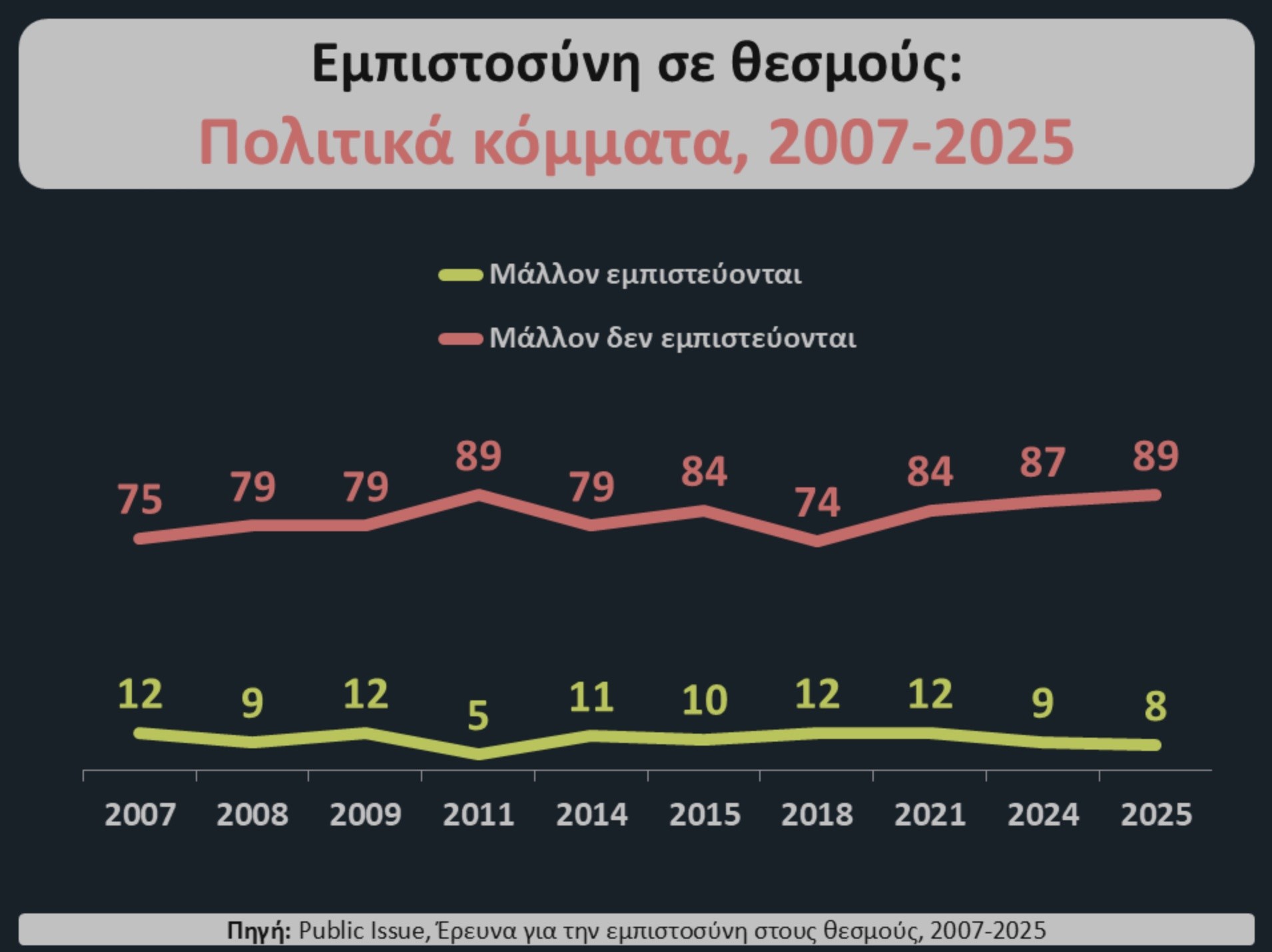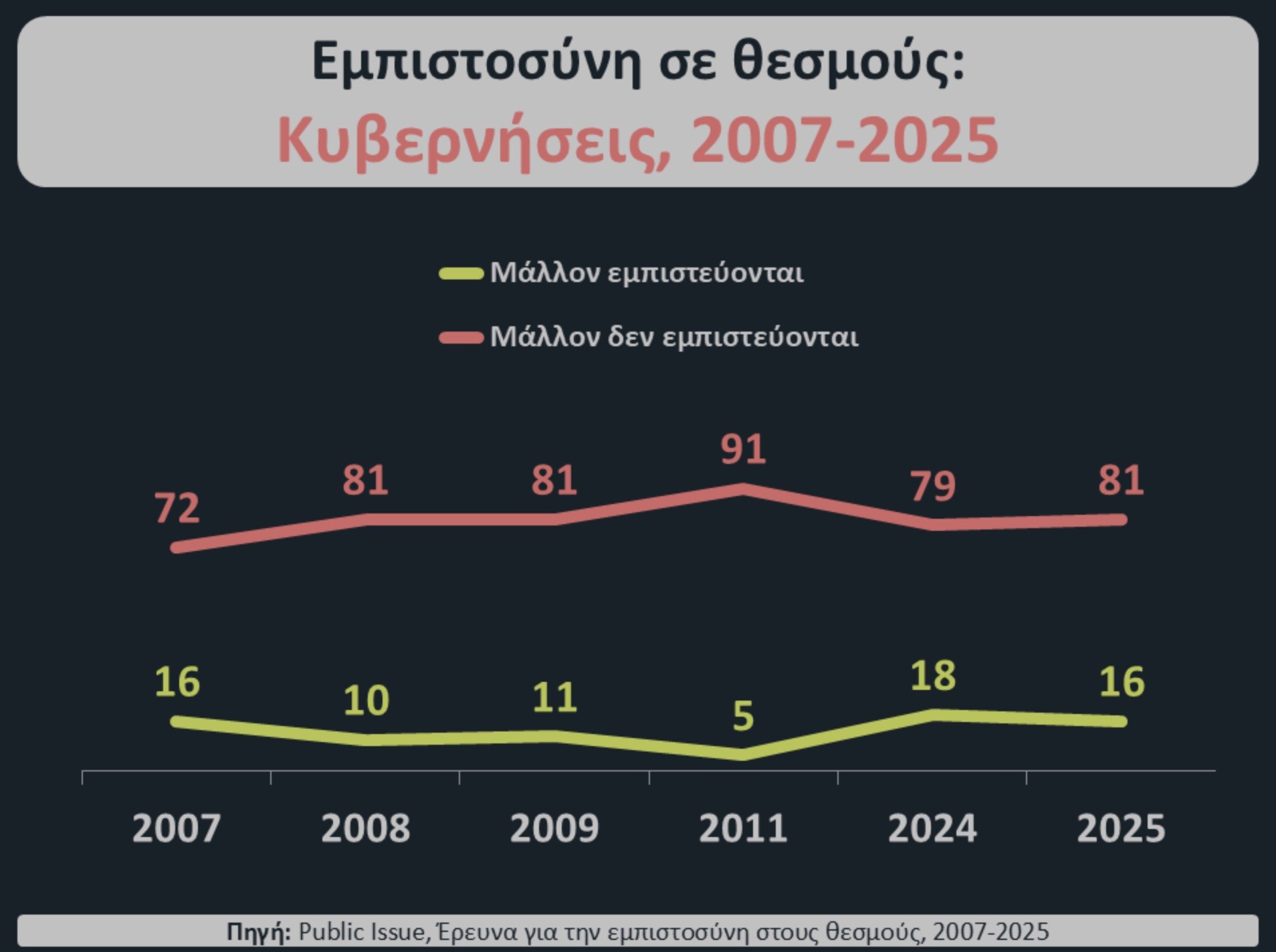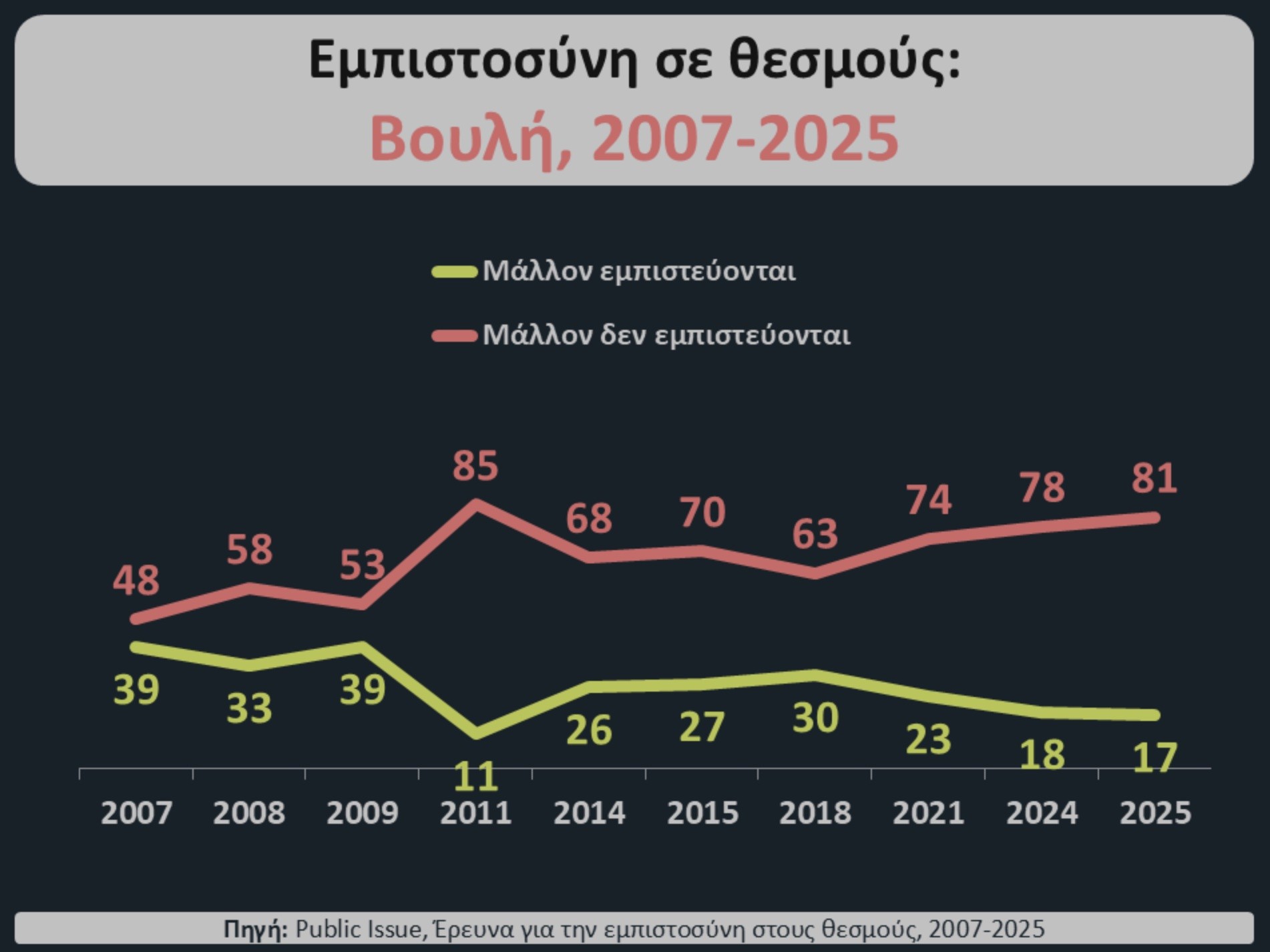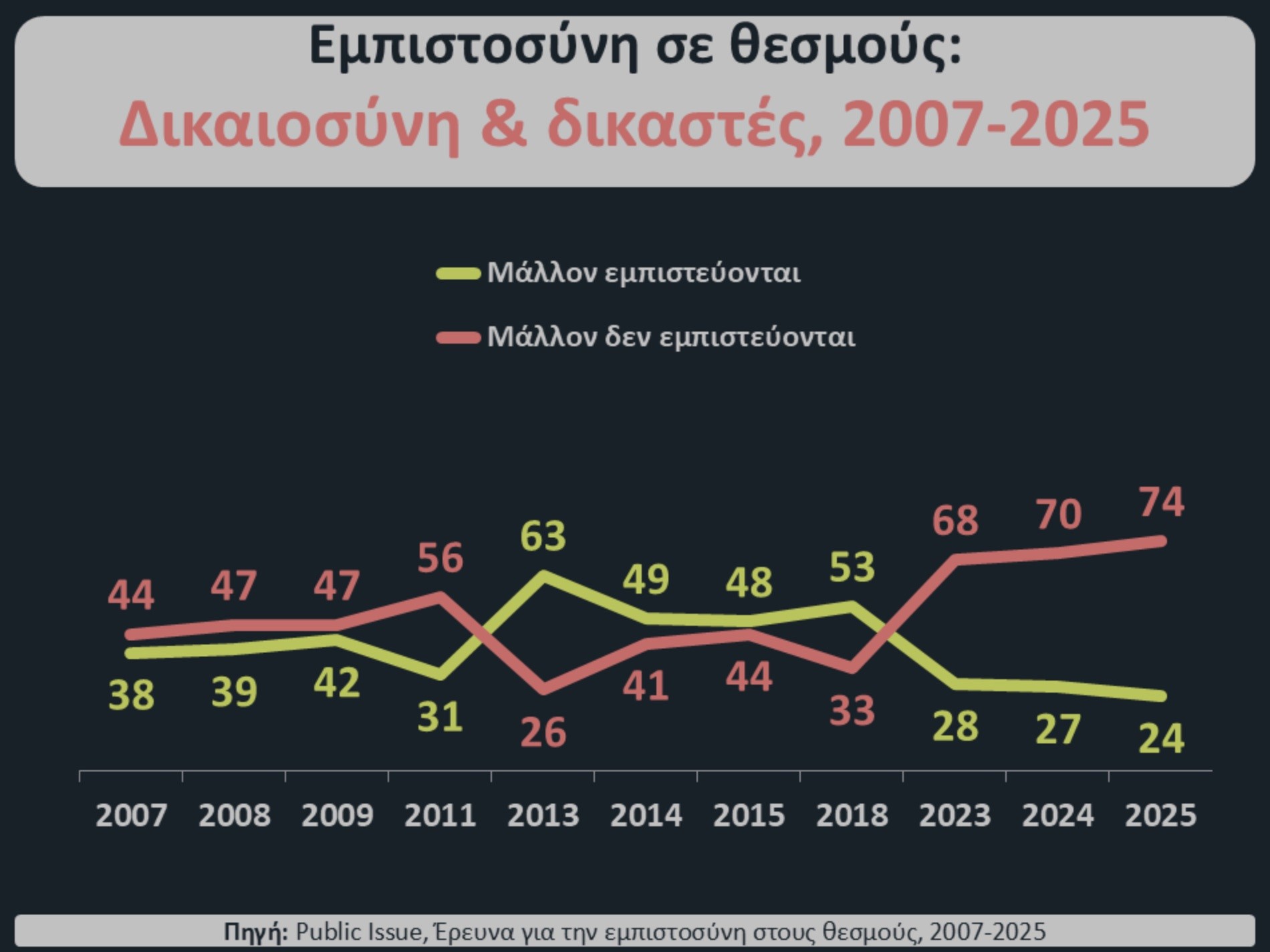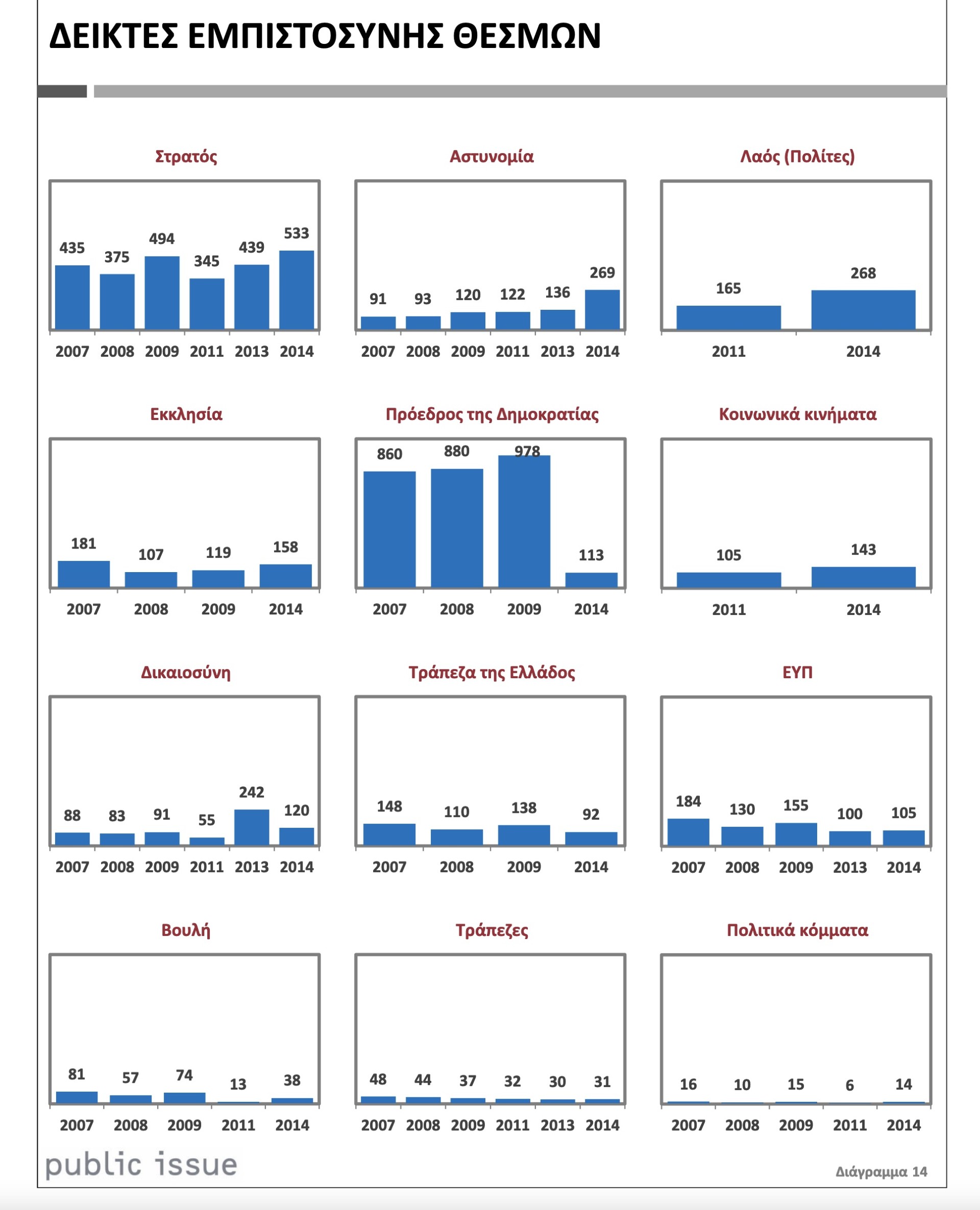Particular interest was generated by yesterday’s remarks from former Prime Minister, Kostas Karamanlis at an event organized in honor of former Parliament Speaker Anna Psarouda-Benaki, specifically his references to the quality of our parliamentary democracy and the degree of citizens’ trust in the country’s institutions. The essence of his statements, however, is condensed in the following excerpt: “Parliamentary democracy has as fundamental prerequisites the proper functioning of institutions, the establishment of rule of law, the substantial independence of Justice. When these are questioned, when a very large segment of society, and one that is constantly expanding, believes that these do not apply, that sensitive institutions are manipulated, that parliament is degraded, that governments ignore their needs and do not understand their anxieties, that the powerful are not controlled, that state strictness is exhausted upon less privileged citizens, then we have a crisis. A crisis of devaluation, a crisis of delegitimization, a crisis of questioning and rejection of the institutional framework and the political system. These phenomena are real, they are not distant from the prevailing social perception today both internationally and in Europe and in our country.”
Moreover, he went a step further emphasizing that “restoring citizens’ respect and trust requires laborious and titanic effort. If it proves unattainable or fruitless, we are heading towards a major institutional crisis. If it is underestimated or ignored, we are rapidly moving towards a first-magnitude political crisis. I note that History teaches us that such crises, in Greece’s case primarily due to geopolitical conditions, almost always coincide with national crises,” he noted.
Read: Kostas Karamanlis: Criticized opposition attacks on Justice – Commentary from government sources
What data shows regarding Karamanlis’s “barbs”
The above references were taken by several political analysts as pointed barbs at the Mitsotakis government and its policies from 2019 to today. However, if one studies the longitudinal data of citizens’ trust towards the country’s institutions, and specifically towards Justice, parties, governments, ministries and Parliament, they will find that already from the era of governance by Kostas Karamanlis himself, the figures are disappointing and almost identical to today’s data. In other words, as experienced political analysts note, today’s conditions that Mr. Karamanlis described yesterday as a “crisis of devaluation, crisis of delegitimization, crisis of questioning and rejection of the institutional framework and the political system,” prevailed with certain variations during his own governance period. Moreover, during the governance periods of George Papandreou, Antonis Samaras and Alexis Tsipras, this climate worsened or remained at high levels, with Mr. Karamanlis not referring to these governments in yesterday’s intervention. The following data from Public Issue’s annual surveys on citizens’ trust in institutions are indicative.
Kostas Karamanlis governments 2004-2009
December 2007
Parties:
Distrust: 75%
Intermediate position: 13%
Trust: 12%
Governments:
Distrust: 72%
Intermediate position: 11%
Trust: 16%
Ministries:
Distrust: 55%
Intermediate position: 19%
Trust: 25%
Parliament:
Distrust: 48%
Intermediate position: 13%
Trust: 39%
Justice and Judges:
Distrust: 43%
Intermediate position: 19%
Trust: 38%
Greek institutional trust index
President of Republic 860
Justice and Judges 88
Parliament: 81
Ministries: 45
Governments: 22
Parties: 16
The analysis by Public Issue’s political analyst Giannis Mavris of that period stated that “the crisis of trust in state and governance institutions should be considered unprecedented. The devaluation of political parties, ranked in last (46th) position of the index (CI=16), of governments (CI=22) and the state administrative machinery (CI=45) is complete. The accumulated social distrust has also swept away Parliament (CI=81), but is also manifested in administrative levels that theoretically are closer to citizens (Municipalities, CI=113 and Prefectures CI=84).”
December 2008
Parties:
Distrust: 79%
Intermediate position: 13%
Trust: 8%
Governments:
Distrust: 81%
Intermediate position: 9%
Trust: 10%
Ministries:
Distrust: 67%
Intermediate position: 13%
Trust: 21%
Parliament:
Distrust: 58%
Intermediate position: 8%
Trust: 33%
Justice and Judges
Distrust: 47%
Intermediate position: 14%
Trust: 39%
Greek institutional trust index
President of Republic 880
Justice and Judges 83
Parliament: 57
Ministries: 31
Governments: 12
Parties: 10
Similarly, Giannis Mavris’s analysis from Public Issue for that period stated that “Political Parties are ranked again this year in last (48th) position of the index (CI=10, recording annual losses of 6 units), governments in second-to-last (47th), with CI=12, compared to 22 in 2007 (-10) and the state administrative machinery, i.e. ministries, in 44th (42nd in 2007), with index CI=31, compared to 45 in 2007 (-14). Accumulated social distrust sweeps away Parliament too, which drops from 30th position in 2007 to 38th this year (CI=57, compared to 81 previously, -24). At marginal levels fluctuates also trust in administrative levels that theoretically are closer to citizens (Municipalities, CI=115, compared to 113 before and Prefectures CI=102, compared to 84). Compared to the positive image recorded by corresponding surveys of previous historical periods, the low trust in Police (CI=93) and Justice (CI=83) is evident. The intensifying social disapproval of these institutions is likely related, on one hand to increased state repression in the last three years (beginning with social protest in Education), disputes caused by increased social surveillance using cameras, and on the other hand to corruption phenomena, revelation of the judicial circuit, etc.”
December 2009
Almost identical data is recorded by a corresponding 2009 survey, with Giannis Mavris of Public Issue noting that “during the past year, the profound crisis characterizing all institutions in Greece shows no signs of limitation. On the contrary, the minimal improvement of the overall picture is most likely due to the political change that occurred last October. A fact that -as a rule- affects the general social climate favorably, but temporarily. Consequently, the institutional crisis rather tends to reproduce with the same intensity. Citizens’ trust in governance, economic and social institutions constitutes an important parameter of a country’s political and economic stability. The overall ranking of institutions, based on their trust index values, is given in the relevant diagram and is particularly revealing, not only for political institutions, but also economic ones.
With the exception of the first three and very few others, the crisis of trust in state and governance institutions continues to be unprecedented. It constitutes an open crisis of their social legitimacy. The devaluation of governments, political parties and the state administrative machinery did not change noticeably during 2009. Political parties rank this year in second-to-last (47th, from last 48th in 2008) position of the index (CI=15, compared to 10 the previous year, +5), something that certainly cannot be interpreted as success. Governments drop to last (48th), with CI=14, compared to 12 in 2008 (+2) and the state administrative machinery, i.e. ministries, to 43rd (44th in 2008), with index CI=34, compared to 31 in 2008 (+3). Accumulated social distrust continues to afflict Parliament too, which however occupies 30th position this year from 38th it held last year (CI=74, compared to 57 previously, +17). Conversely, trust decreases this year in administrative levels that theoretically are closer to citizens, specifically: municipalities (CI=91, compared to 115 before, -24) and prefectures (CI=83, compared to 102 in 2008, -19).”
Citizens’ trust in institutions data from 2007 to 2025
